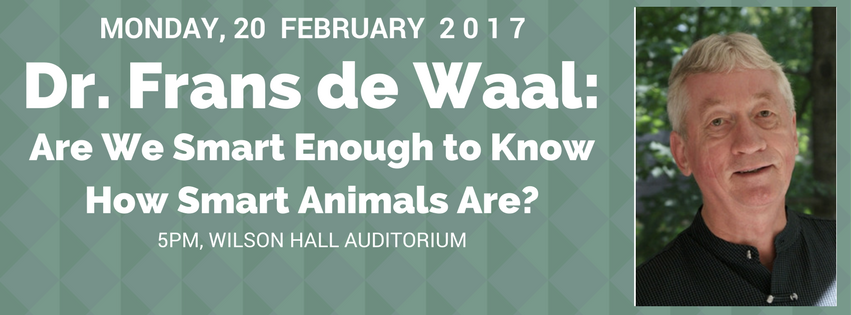Dr. Frans de Waal

Frans de Waal is the Charles Howard Candler professor of Primate Behavior in the Emory University psychology department in Atlanta, Georgia, and director of the Living Links Center at the Yerkes National Primate Research Center and author of numerous books including Chimpanzee Politics and Our Inner Ape. His research centers on primate social behavior, including conflict resolution, cooperation, inequity aversion, and food-sharing. He is a Member of the United States National Academy of Sciences and the Royal Netherlands Academy of Arts and Sciences (Wikipedia). His most recent books include: Are We Smart Enough to Know How Smart Animals Are? (2016), The Bonobo and the Atheist (2014), The Age of Empathy: Nature’s Lessons for a Kinder Society (2010), and Chimpanzee Politics: Power and Sex Among Apes (2007).
In his own words: I am a Dutch/American biologist, born in the Netherlands in 1948, having lived in the USA since 1981. My passion is primate behavior, and the comparison between primate and human behavior. I pursue the first as a scientist and the second as a writer of popular books. For me, there is nothing more logical than to look at human society through the lens of animal behavior. (Source: Amazon.com)
I have a Ph. D. in zoology and ethology (the study of animal behavior) from the University of Utrecht, and now teach Psychology at Emory University, in Atlanta. My first book, "Chimpanzee Politics," compared the schmoozing and scheming of chimpanzees involved in power struggles with that of human politicians. The book even reached the reading list of the congress in Washington. Ever since, I have drawn parallels between primate and human behavior, from aggression to morality and culture. My daily work consists of teaching and research, which I do at America's oldest and largest primate center, the Yerkes National Primate Research Center. I direct the Living Links Center there, which specializes in behavioral studies of monkeys and apes, mostly on social behavior and intelligence, so as to better understand human evolution. We do much of our work at a field station, outside of Atlanta, where the primates live in large open-air enclosures. All studies we conduct are behavioral and non-invasive.
Cohen Center lecture on Monday, 2/20 at 5pm in Wilson Hall Auditorium

